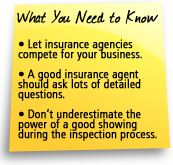|
When companies compete for your business, they will be more inclined to offer you competitive pricing. “When it comes down to it [insurance agents] make more money when your premiums [are] higher,” Simmonds says. “The bid process, it drives premiums down.” The entire process might take between 10 to 15 hours of the business owner’s time, depending on the complexity of your business, he says. Start looking for agents by asking other business owners for recommendations and conferring with local trade groups. When it’s time to begin the process, you can either have your current agent create a document that defines bid specifications for other agencies, or you can solicit proposals from potential bidders, including your agency, he says. In Simmonds’ opinion, many business owners go overboard with the number of insurance agencies they consider. He recommends narrowing your prospects to two agencies. Choose the Right Agent Another telling sign is the quantity and detail of questions a prospective agent asks you. “You want to probably find somebody who is going to ask more questions in terms of your business and your needs,” says Richard A. McGrath, president of McGrath Insurance Group, Inc. in Sturbridge, Mass. An agent who is looking out for your best interests will want to know as much about your business’s history and your goals as possible. Choosing your insurance provider might seem like a very cerebral process, but remember that the insurance agent you select will be the one standing beside you should the unimaginable happen. You need to listen to your instincts, and consider, “Which of these guys would I want to stand next to me if my business was in ashes?” Simmonds says. “When you get right down to it, it comes down to a gut reaction.” In many respects, the answer to this question is the most telling part of the selection process. Ace the Inspection Beyond the inspection, McGrath considers the following to help determine the risk associated with a potential client: Do they have a marketing and business plan? How is the business financed? Will this business be viable? Entering into a relationship with a client is similar to becoming an advisor and partner with that business. For this reason, McGrath studies the business as an investor would. Having higher deductibles is a good cost saving measure, and also sends the message that you are a good risk because you are willing to share the losses should something happen. You may also be able to drive down insurance premiums by having your workers attend safety seminars on issues that relate to their positions, such as defensive driving courses or classes on safe lifting procedures, McGrath says. As McGrath puts it, “Safety yields dividends.” |
|
 |
|||


